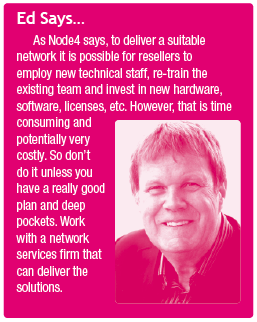
Comms Business Magazine takes a look at how more sophisticated, larger and geographically diverse data networks can be put together by suppliers constructing solutions based on an integrated set of products from different suppliers.
Today we live in a Global Village. It’s a term that has been around for quite a while and closely associated with philosopher Marshall McLuhan and popularised in his books The Gutenberg Galaxy: The Making of Typographic Man and Understanding Media, both published in the early 1960’s.
McLuhan described how the globe has been contracted into a village by electric technology and the instantaneous movement of information from every quarter to every point at the same time. In bringing all social and political functions together in a sudden implosion, electric speed heightened human awareness of responsibility to an intense degree.
Many observers say that Marshall McLuhan predicted the Internet in his writing as an ‘extension of consciousness’ thirty years before its commercialisation when he said, “The next medium, whatever it is - it may be the extension of consciousness - will include television as its content, not as its environment, and will transform television into an art form. A computer as a research and communication instrument could enhance retrieval, obsolesce mass library organisation, retrieve the individual’s encyclopaedic function and flip into a private line to speedily tailored data of a saleable kind.”
You can see where he was going.
Today, the term ‘Global Village’ could be used to describe the Internet and World Wide Web. On the Internet, physical distance is even less of a hindrance to the real-time communicative activities of people, and therefore social spheres are greatly expanded by the openness of the web and the ease at which people can search for online communities and interact with others who share the same interests and concerns.
Therefore, this technology fosters the idea of a conglomerate yet unified global community. According to McLuhan, the enhanced “electric speed in bringing all social and political functions together in a sudden implosion has heightened human awareness of responsibility to an intense degree.” Increased speed of communication and the ability of people to read about, spread, and react to global news quickly, forces us to become more involved with one another from various social groups and countries around the world and to be more aware of our global responsibilities.
Similarly, web-connected computers enable people to link their web sites together. This new reality has implications for forming new sociological structures within the context of culture. Contemporary analysts question the causes of changes in community and its consequences some potentially new sociological structure. Most of them have pointed out the fact that the increased velocity of transactions has fostered interactional density, making social networks a technical catalyst for social change. Across the global village people have reached out and transcended their neighbourhood. They are involved in complex community networks stretching across cities, nations, and oceans. Yet the ease with which telecommunications connect friends of friends may also increase the density of interconnections within already existing social clusters. Therefore, the global village’s implications on sociological structures are yet to be found, whether it fosters cultural exchanges and openness or not.
However, when it comes to the business side of connectivity and the uses of fast, interconnected networks then the objectives that can be achieved are, in our opinion, well defined yet continuously developing.
What I mean by this is that networks, amongst other business assets held or controlled by organisations, can be leveraged to deliver competitive advantage, control or reduce costs and help in retaining customers. Just look at what happened last month when Ebay’s network went down for 12 hours – no-one could connect and sales screamed to a halt, no-one knew where to ship anything and a panic over PayPal security swiftly followed.
What I mean by continuously developing is the rapid rate of change in connectivity technology. Is anyone predicting this rate will slow down?
Having put a global context down as a marker for networks how are UK firms aligned for putting together dispersed connectivity plans for their channel partners and making sure they work to deliver those business benefits?
Chris Pagel, Network Services Manager at Node4, says that when it comes to delivering a high performance, resilient and secure data network it really is all about being able to bring together best in class equipment and services.
“In order to do that, integrators undoubtedly have a number of advantages that resellers should tap in to rather than compete against.
To deliver a suitable network it is possible for resellers to employ new technical staff, re-train the existing team and invest in new hardware, software, licenses, etc. However, that is time consuming and potentially very costly.
Of course, by partnering closely with relevant vendors, resellers can gather expertise quickly, but this often comes at the cost of a reseller’s flexibility to provide a full range of customised solutions as they can no longer remain truly vendor agnostic.
On the other hand, integrators like Node4 are able to make significant investment to design, build and operate robust and flexible network infrastructure, providing resellers and businesses with a broad range of services. They are also able to connect to multiple providers and use equipment from multiple vendors - providing high performance and resilience. Furthermore, at Node4 our entire infrastructure is housed in our highly secure, ISO27001 and ISO9001 certified Data Centres - offering complete protection for businesses’ data from both physical and virtual threats.
For the channel this offers the best of both worlds - a fully managed service, supported by highly trained specialist engineers that can be sold with a high degree of flexibility to users, without the need to invest heavily in infrastructure or expertise themselves. Ultimately it is all about delivering the right service at the right price - it would be folly to trade one for the other - and for that reason integrator partners can be invaluable for resellers.”
What are the advantages of dealing with integrators?
Mark Curtis-Wood, Head Of Network Services at Nimans: Being an integrator provides access to multiple different suppliers, products and services – to cherry pick and put together the right overall customer solutions. One supplier might be strong in one area and a different one better in another. If a reseller was just buying all those services from one supplier, he would likely get a great price and service in one area but not across the board. By utilising an integrator like ourselves we can source the most effective solution, not necessarily just around cost but something that’s best customer led over the long term. Carriers have strengths and weaknesses and we can bring all of the best parts together in one compelling package. We make it easy for a reseller and also give them more ‘competitive clout’ across multiple different vendors that they very often don’t have individually.
James Arnold Roberts, Director at Genius Networks: As an individual reseller, working with carriers can be a less than satisfying experience: trying to deal with multiple partners where you are not large enough to receive priority attention or to negotiate competitive pricing. Furthermore, no single network provider of all the tier 1s and tier 2s has a truly global reach, so providing network services to Europe and globally is not an easy task.
The deployment of unified communications has placed immense pressure on network managers to maintain quality of service for voice but, as businesses seek new global markets, latency has become the single greatest risk to business communications. The big global carriers are less able and less interested in micro-managing the voice requirements of smaller businesses.
An integrator, or aggregator, has the role of a specialist provider that can manage voice latency intelligently and responsively with a service that is affordable and agile enough to deal with the characteristics of voice traffic.
The integrator/aggregator has a peer to peer relationship with carriers so the difficulty of dealing with a number of carrier partners is taken away. As greater bandwidth is purchased, economies of scale means that cost savings can be passed on to the channel. They can also pull together services to provide a best of breed and truly global solution.
How do they manage to construct their solutions for the channel?
Mark Curtis-Wood: It boils down to the strength of relationships with multiple different vendors and understanding where their sweet spots are. One of the key things we do with our suppliers is understand what they are good at and not so good at. Therefore we avoid any pitfalls to ensure the ‘best fit’ for our customers. We collaborate with our suppliers which means we both have an interest in delivering long term solutions to our customers.
James Arnold Roberts: The integrator/aggregator has the advantage of flexibility over carriers being able to build solutions the reseller requires, rather than trying to fit the channel into a box.
Managing latency demands expertise and a deep understanding of the behaviour of voice traffic across global networks. The channel benefits from the integrator/aggregator’s network understanding and skills that enable them to mould solutions together from different partners.
Many carriers do not have a 21st century network infrastructure so our approach at Genius has been to build our own major core network – creating a best of breed, next generation network built for SIP, convergence model. Our network, named Core Routing Infrastructure and Services Provisioning (CRISP) has strategically built hubs to manage latency – to ensure true convergence with quality voice delivery.
This gives us the control and ability to provide SIP, internet and applications to enhance offerings. We can deliver the growing number of cloud services over the network rather than the internet so that apps are delivered directly to the end user enabling QoS and SLAs.
How are SLAs managed?
 Mark Curtis-Wood: This is an interesting area because one of the biggest challenges is that each supplier will have a different set of SLA’s. What we do is aggregate all of those SLA’s into one transparent document as the reseller relationship is solely with us. We take on the responsibility and remove any worry and hassle.
Mark Curtis-Wood: This is an interesting area because one of the biggest challenges is that each supplier will have a different set of SLA’s. What we do is aggregate all of those SLA’s into one transparent document as the reseller relationship is solely with us. We take on the responsibility and remove any worry and hassle.
James Arnold Roberts at Genius:Our CRISP platform is built on the best MPLS and SIP connectivity in the business, backed up with a physical fibre interconnect with all our carrier partners, ensuring that we can provide a fully managed SIP service with guaranteed QoS and end to end SLA. A flat SLA across all tier 1 – instead of separate SLAs for each carrier – simplifies things greatly for the reseller.
Are there real cost savings to be made or is it about getting the user the right service?
Mark Curtis-Wood: It’s a combination of the two. If the reseller solution has to be driven commercially and it’s all down to price we can actively price against that. But normally when we are putting a solution together it’s more around understanding what the customer wants and needs and getting the service right. We have a team of specialists who fully understand how to identify those needs and extract the right information. It’s not always who is the cheapest – but understanding the customer’s needs better, rather than someone who just goes in with a spreadsheet. Delivering a much broader all-round solution is key to success.
James Arnold Roberts: Every business is under commercial pressure and a solution must be commercially attractive but, at the same time, the network HAS to deliver what the business needs, otherwise it’s a waste of money.
The ‘one price, one network for all’ approach adopted by the global carriers makes it impossible for the channel to offer attractive pricing and many businesses are not in a position to pay the excessive premiums charged by the carrier in order to attain the required QoS.
The carrier relationships the integrator/aggregators have means that better pricing can be negotiated than if the reseller went it alone – but it still has to work well! Genius is equipped to meet the technical requirements of the voice network whilst meeting the budgetary requirements of the customer.\
Case Study:
How Abzorb is working with aggregator, Genius Networks to provide networking and extended services. Highlights:
Smaller mobile/fixed line provider wanted to add networking services to portfolio
Need to differentiate through services
By partnering with network aggregator Genius Networks, Abzorb can provide bespoke and converged solutions with global capabilities
Abzorb is also white labelling Genius’ Partner Portal to extend its online support services
Abzorb is a Huddersfield based provider of mobile and fixed line comms. Abzorb’s success in delivering personal and professional customer support has been rewarded by industry awards, accreditations and a glowing reputation in the market.
Networking has become an important part of any service provider’s portfolio and Abzorb wanted to include converged network solutions in its portfolio. While the provision of broadband and simple point-to-point connections was within Abzorb’s capability, as a smaller reseller, the need for bespoke and converged solutions with SLAs presented a challenge. And that’s without even considering global networks.
Abzorb also realised that customer service has become key to growth in a climate where ultra-competitive pricing and tariffs, has made it the key differentiator amongst service providers. Hence Abzorb was looking to develop its online support services.
Provision of network services
To enable the provision of network services Abzorb considered building its own network but this would be time consuming and expensive.
The company also considered partnering with carriers, but the need for more than one carrier to deliver a service meant that SLAs would be tricky. Furthermore, smaller resellers often suffer slower response times from carriers than larger partners and many are not included in the wholesale pricing benefits, making the relationship less profitable.
The solution - networking
So Abzorb started talking to Genius Networks.
Mike Walsh, Abzorb Director, “Genius delivers solutions swiftly, from best-of-breed global carriers, often with a single SLA for multi-carrier solutions and often with prices better than wholesale.
Genius does this thanks to its unique platform that connects the Genius core infrastructure with the carriers. Called CRISP - Core Routing Infrastructure and Services Provisioning, it takes the time, complexity and administration away from the reseller’s task of network provisioning.”
Once the partnership was in place Abzorb was soon signing up network contracts for customers both new and existing.
With networking covered, Abzorb turned its focus on to services. Abzorb tapped into Genius’ self-designed Partner Portal to provide its resellers with the key services they need instantly and easily wherever they are. Central to the services is a pricing tool allowing instant quoting on the latest prices from all the main carriers across the UK and the world, simply by inputting the postcode. On acceptance of the quote, the partner’s order is delivered for provisioning and deployment automatically.
In addition, the Portal provides access to network monitoring reports, a technical help desk and troubleshooting platform plus a section for marketing material and sales support collateral. Everything is own-branded, including the Portal, helping the reseller deliver a well-presented managed service.
Global Village
 Now, with the Partnership working in full swing, Abzorb has also discovered how Genius transforms the normally complex task of provisioning global networks. With international carrier connections supported by Genius’ own data centre hubs around the world, Genius makes it simple to fulfil client requirements for overseas solutions and has opened a whole new opportunity for sales from service providers normally fearful of taking on such projects.
Now, with the Partnership working in full swing, Abzorb has also discovered how Genius transforms the normally complex task of provisioning global networks. With international carrier connections supported by Genius’ own data centre hubs around the world, Genius makes it simple to fulfil client requirements for overseas solutions and has opened a whole new opportunity for sales from service providers normally fearful of taking on such projects.
Mike Walsh summed up this key benefit, “More and more resellers are seeking to capitalise on opportunities in overseas markets and to migrate to hosted and cloud-driven processes. Working with Genius means we can deliver the reliability and assurance our customers need to adopt these innovative approaches on a global scale if required.”

